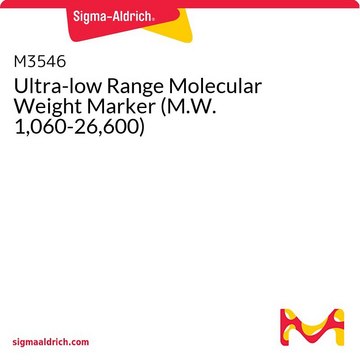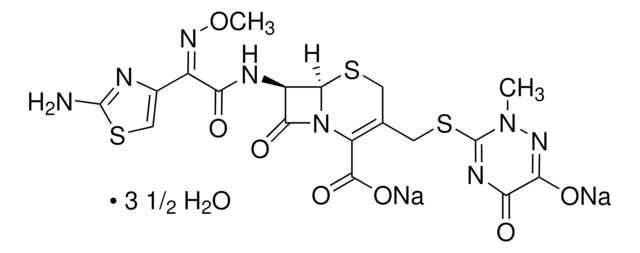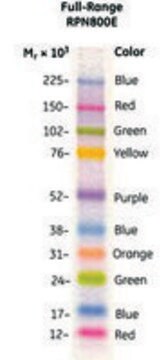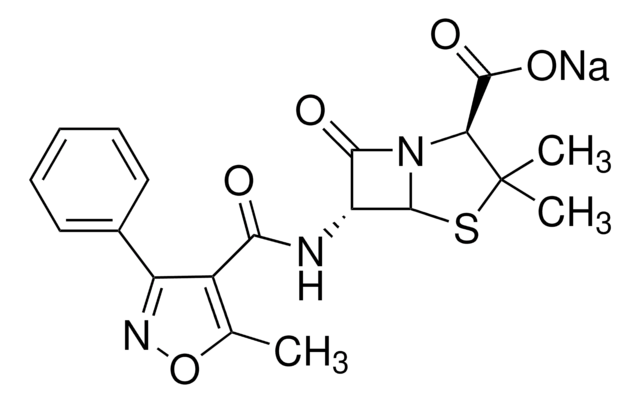C6210
Color Marker Ultra-low Range (M.W. 1,060-26,600)
Synonym(s):
protein markers, protein molecular weight markers, protein standards
Sign Into View Organizational & Contract Pricing
All Photos(1)
About This Item
UNSPSC Code:
41105337
NACRES:
NA.25
Recommended Products
form
liquid
Quality Level
100
200
usage
sufficient for 20 applications (on 10 cm × 10 cm mini gels)
storage temp.
−20°C
Related Categories
Application
Color Marker Ultra-low Range (M.W. 1,060-26,600) is for use in Tris-Tricine SDS-PAGE.
This sigma marker has been used in sodium dodecyl sulfate–polyacrylamide gel electrophoresis (SDS-PAGE).
This sigma marker has been used in sodium dodecyl sulfate–polyacrylamide gel electrophoresis (SDS-PAGE).
Packaging
Each vial of Color Marker Ultra-low Range (M.W. 1,060-26,600) contains 200 μl of a solution of six dye-conjugated polypeptides in 10 mM Tris-HCl, pH 7.0, 0.5% SDS, 2 mM EDTA, 4 M urea, 33% glycerol and 0.01% sodium azide.
Storage Class Code
10 - Combustible liquids
WGK
WGK 1
Flash Point(F)
Not applicable
Flash Point(C)
Not applicable
Certificates of Analysis (COA)
Search for Certificates of Analysis (COA) by entering the products Lot/Batch Number. Lot and Batch Numbers can be found on a product’s label following the words ‘Lot’ or ‘Batch’.
Already Own This Product?
Find documentation for the products that you have recently purchased in the Document Library.
Customers Also Viewed
Q Li et al.
British journal of cancer, 97(3), 420-425 (2007-07-12)
It is known that interferon-gamma (IFN-gamma) is produced by activated T and NK lymphoid cells, mononuclear cells, and macrophage and dendritic cells. Our previous studies have shown that IFN-gamma-like immunoreactivity also appears in human adrenal cortical tumour and phaeochromocytoma. To
AKAP79-mediated targeting of the cyclic AMP-dependent protein kinase to the beta1-adrenergic receptor promotes recycling and functional resensitization of the receptor.
Gardner LA, et al.
The Journal of Biological Chemistry, 281, 33537-33553 (2006)
Maren Thomaier et al.
Biochemistry, 55(48), 6662-6672 (2016-12-10)
The interaction of the amyloid-β protein (Aβ) with neuronal cell membranes plays a crucial role in Alzheimer's disease. Aβ undergoes structural changes upon binding to ganglioside GM1 containing membranes leading to altered molecular characteristics of the protein. The physiological role
Our team of scientists has experience in all areas of research including Life Science, Material Science, Chemical Synthesis, Chromatography, Analytical and many others.
Contact Technical Service








